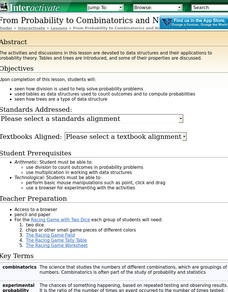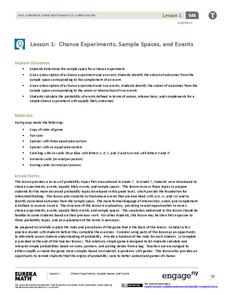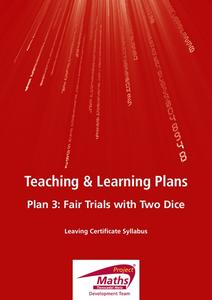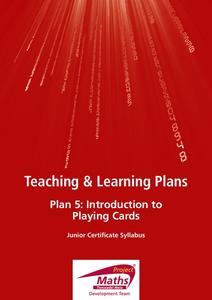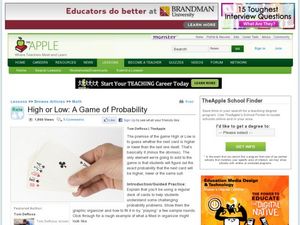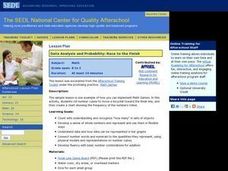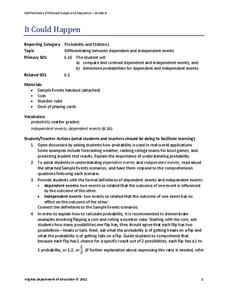Curated OER
Picking Chips: Experimental Probability
Learners apply the concepts of an event occurring to playing a game. In this probability lesson,students differentiate between experimental and theoretical probability.
Curated OER
Tetrahedral Dice
Put those thinking hats on and look at all the possible outcomes from rolling two different four-sided dice. The challenge in this problem is finding all the combinations when adding and subtracting the numbers from each die and creating...
Curated OER
Probability: The Study of Chance
Learners conduct an experiment, determine if a game is fair, and collect data. They interpret data, then display line graph. They conduct analysis of game for probability.
Curated OER
Mathematics of Fair Games
Students examine mathematicians' notion of fairness in games of chance. They work in pairs to perform three different experiments using macaroni and paper bags. They record their results on charts and compare their data.
EngageNY
Comparing Estimated Probabilities to Probabilities Predicted by a Model
Small groups devise a plan to find the bag that contains the larger percentage of blue chips. they then institute their plans and compare results to the actual quantities in the bags.
Shodor Education Foundation
From Probability to Combinatorics and Number Theory
What middle schooler does not enjoy an occasional online game? In this lesson play, you will find embedded links to an online probability game, and informative pages about how division is used in probability, the concept of tree models,...
Actis
Handling Data: Probability, Tree Diagrams
Clean, but captivating, two online simulations demonstrate probability for middle schoolers. They can choose the number of coins and tosses and watch as the results pile up. They can choose from a variety of spinner types and the number...
EngageNY
Chance Experiments, Sample Spaces, and Events
Want a leg up on the competition? Show classes how to use mathematics to their advantage when playing games. Learners calculate probabilities to determine a reasonable scoring strategy for a game.
Project Maths
Fair Trials with Two Dice
Life's not fair, but dice games should be. After playing a two-person game with a pair of dice, scholars investigate the fairness of the game. They consider the number of possible outcomes using the fundamental counting principle and...
Project Maths
Introduction to Playing Cards
A fun, engaging instructional activity is definitely in the cards for your future. Pupils explore a deck of playing cards in the fifth of six parts in the Statistics and Probability series to learn about its suits and the number of each...
Project Maths
Outcomes of Coin Tosses
Flip a coin: heads, use the resource; tails, use the resource. The fourth of six installments of the Statistics & Probability unit looks at coin tosses and probability. The class conducts an experiment and sees that the outcomes of...
Curated OER
Probability & Game Theory
Students explore the concept of probability. In this probability lesson, students perform various probability experiments including flipping a coin, picking m&m's out of a bag, and the birthday problem.
Curated OER
Games for Probability: In-Class and Powerball Simulation
Your soon-to-be statisticians play a game to understand the difference between independent and dependent experiments and probability. They draw colored cubes from a bag and then, by either replacing the cube in the bag, or not, for each...
Curated OER
High or Low- Probability
Students use playing cards to examine probability. In this probability lesson, students work in groups with a deck of cards and predict if the next card they lay down will be high or low. Students fill out a graphic organizer with their...
Curated OER
Logic and Problem Solving: Math Hunt
In these math lesson plans, students discuss how math problems are written to reflect real-world situations. They complete an online Math Hunt using specific web tools, and work individually to create their own Math Hunts....
Curated OER
Probability
Second graders experiment with probability. For this probability lesson, 2nd graders pick colored beans from a bag to find the chance of getting different colors. They make fair and unfair spinners and record the data after spinning...
Curated OER
Chances Are
Upper graders examine the concept of probability. They collect data and create a bar graph. They must interpret the data as well. Everyone engages in hands-on games and activities which lead them to predict possible outcomes for a...
Curated OER
Quarter, Nickel, Dime....
An engaging game called, "Quarter, Nickel, and Dime" is presented in this math lesson. Players are given an envelope with slips of paper that represent the three coins. In pairs, they play the game 18 times, and the whole class charts...
Curated OER
Probability
Fifth graders participate in a lesson that is concerned with the mastery of math concepts related to probability. They play a math game that is an adaptation from Rock, Paper, and Scissors.
Curated OER
Data Analysis and Probability Race to the Finish
Students practice addition facts, record data, and construct a bar graph. In this probability lesson, students participate in a board game in which bicycles move towards a finish line based on players completing addition problems. Dice...
Curated OER
Probability- Based Bingo Lesson Plan
Statisticians play a game of Bingo to discover the meaning of probability. They are given 12 markers to distribute across the numbers 1-12 on their playing mat. As a pair of dice is rolled, markers are removed from the playing mat. The...
Virginia Department of Education
It Could Happen
Understanding of probability will probably increase with the use of a refined resource. Pupils learn to distinguish between dependent and independent events as they calculate the probabilities of these types of events in various...
Curated OER
The Game of Chance
Third graders use manipulatives to determine the probability of outcomes. For this probability lesson, 3rd graders roll dice and use spinners to determine the probability of outcomes. They determine if games are fair/unfair based on...
Curated OER
Ideas That Lead to Probability
Students explore and define the concept of probability. They utilize a random number generator to determine the fairness of a game. Internet and printable versions fo the activities are included.







